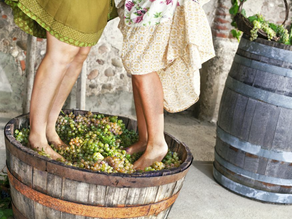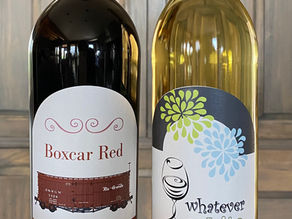Bob's Blog #10 "Corked Wine"- Everything You Didn't Need To Know
- Robert Dolci
- Aug 17, 2022
- 3 min read
Updated: Oct 18, 2022
Recently I went to dinner with some friends. They ordered a decent bottle of red wine. The waiter offered the cork and poured a small quantity of the wine in the glass of the person who ordered the wine. A comment was made that I would be the right person to determine if the wine was “corked”. With tongue in cheek, I acted as if I was an expert and had the ability to determine if the wine in the bottle was “corked”. While it is true that I understood what the waiter was referring to I must admit that I lack the olfactory sensitivity to determine how bad the wine was. Yes, I can tell if it is really bad, but I cannot tell if it is slightly “off”.
I learned online that “Corked wine is wine likely tainted by TCA, a compound that makes it taste and smell less than pleasant, ranging from a wet dog, to wet cardboard, to a beach bathroom. TCA is an acronym for the chemical compound trichloroanisole, which is often responsible for the aromas and flavors often called “corkiness” in wine.”
I’ve smelled some bad wine before but nothing that ever smelled like a beach bathroom. I can just picture myself telling a waiter or sommelier that the wine smells like a beach bathroom. Not!

Many of us when we order wine at a restaurant go through the obligatory task of looking at the wine in the glass, swirling, sniffing, and tasting. The reason the waiter opens a bottle of wine in your presents is not for you to taste the wine. Initially, you are supposed to do nothing more than swirl it in the glass to mix it with some air, and then smell.
The reason for going through the ritual is to simply determine whether the wine is “corked.” A wine that is properly bottled, corked and stored has a better chance of not being degraded by exposure to outside atmosphere (oxidation), bacteria, TCA, light or heat. TCA is the most common cause of cork taint. I believe that we all know why wine bottles are stored on their side with the cork facing slightly downward. Doing so keeps the cork saturated, and therefore keeps the bottle sealed. If the bottle is not stored in the properly downward facing position the cork can dry out and fail. The unfortune results is air and bacteria get into the bottle. Proper storage and a good cork seal may not prevent “corking” as TCA may be in the cork or introduced during the bottling process. Not good. We then complain that the wine turned to vinegar. Chemically that’s true. By my way of thinking, it’s not worthy of being called vinegar. I wouldn’t put it on my salad or cook with it. Not that I cook.
You can have a properly corked bottle of wine in which the wine still went bad. Wine exposed to light, especially UV light, and heat will go bad. Light and heat can rearrange a wine's chemical compounds—just like oxygen and TCA—and cause wine degradation. That means the wine is prematurely aged and its taste, aroma, color, and mouthfeel have been irreparably changed for the worse. I have no idea what the wine will smell like when exposed to light and heat. Probably not like a beach bathroom.
Light exposure is one of the reasons that red wine tends to be stored in dark bottles. But I bet you already knew that. The swirl and sniff routine will also allow you to detect wine that is bad because of light exposure or heat. Not that you can definitively say that the wine went bad because of light exposure rather than a bad cork or TCA. If you look closely at the cork, you might be able to attribute the bad wine to the cork.
Since wine that is spoiled can almost always be identified immediately by smelling it there is no need for tasting it. Actually, if your olfactory system works better than mine you shouldn’t taste it if you’ve determined that the wine was “off” especially if it smells like a beach bathroom. If the wine went bad, you tell the waiter. He/she should get you a different Bottle of wine.
After swirling and sniffing the wine and you’ve determined that it was properly corked and you taste it and you do not like the taste, too bad. That is no justification for rejecting it. You just made a bad choice or maybe your palette is off and not the wine.
So, my dear Edle, that’s all that I know about swirling and sniffing.















Great Blog Bob! Thanks for the education and information on corked wine! As always, I so appreciate your humor as well! Great pics of great fun from our October event. Thank you Jan West for your commit to capturing! Looking forward to our Christmas event and fun fundraiser auction!